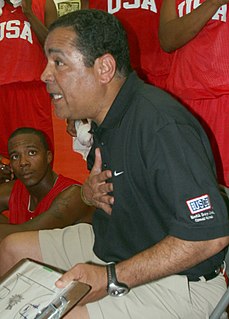A Quote by Kelvin Sampson
Racism was a big part of our community. I'm not going to revisit history, and I'm not going to call out those communities, but the communities we grew up around, we were treated like second- or third-class citizens.
Related Quotes
Is it different to come out now than it was to come out thirty-five years ago? Sometimes. But if you come out now and you come from poverty and you come from racism, you come from the terror of communities that are immigrant communities or communities where you're already a moving target because of who you are, this is not a place where it's any easier to be LGBT even if there's a community center in every single borough.
Latino actors and actresses have had to struggle for decades, but when I came around with Real Women Have Curves, attitudes were starting to change. We screened the film all over the world - in Jewish communities, black communities, Greek communities, German communities - and people across the board said, "That's my family."
Human beings need community. If there are no communities available for constructive ends, there will be destructive, murderous communities... Only the social sector, that is, the nongovernmental, nonprofit organization, can create what we now need, communities for citizens... What the dawning 21st century needs above all is equally explosive growth of the nonprofit social sector in building communities in the newly dominant social environment, the city.
I started going out with one of my managers and he really grew me up in a lot of ways. He introduced me not just to being a full-time traveler, which I was, but he was also really very interested in history and art and continued to open my eyes up to regional history; less splashy histories. He was interested in historical societies and stuff like that. He introduced me to a way of looking at the way communities form that is the foundation for the book that I've just finished writing that has to do with what I see as effective community-building wherever I've been traveling.
Your decision to place your law enforcement resources in these communities is racism, but nobody has called people out on this. The law itself is not racist. But people's decision about where we're going to place our efforts, who we're going to prosecute, who we're not going to prosecute, is racism. And nobody's calling them on it.
Writers in the nineteenth century - people like George Eliot and Flaubert - were accustomed to addressing particular communities with which they shared not only linguistic meanings but also an experience and history. Those communities have progressively split in the twentieth century, and grown more heterogeneous, and writers emerging from minority communities have found themselves addressing audiences closer to their experience and history - a phenomenon derided by conservative white men as identity politics and multiculturalism in the arts.
Mass incarceration is a policy that's kind of built up over the last four decades and it's destroyed families and communities, and something we need to change. And it's fallen disproportionally on black and brown communities, especially black communities, and it's kind of a manifestation of structural racism.
Drug addiction is tearing our communities and our country apart, and until we decide we're going to think differently about it, until we decide that we're going to invest as a country in prevention and treatment, until we decide that as individuals we're going to step up and do our part to address this epidemic, we're not going to solve this.





































